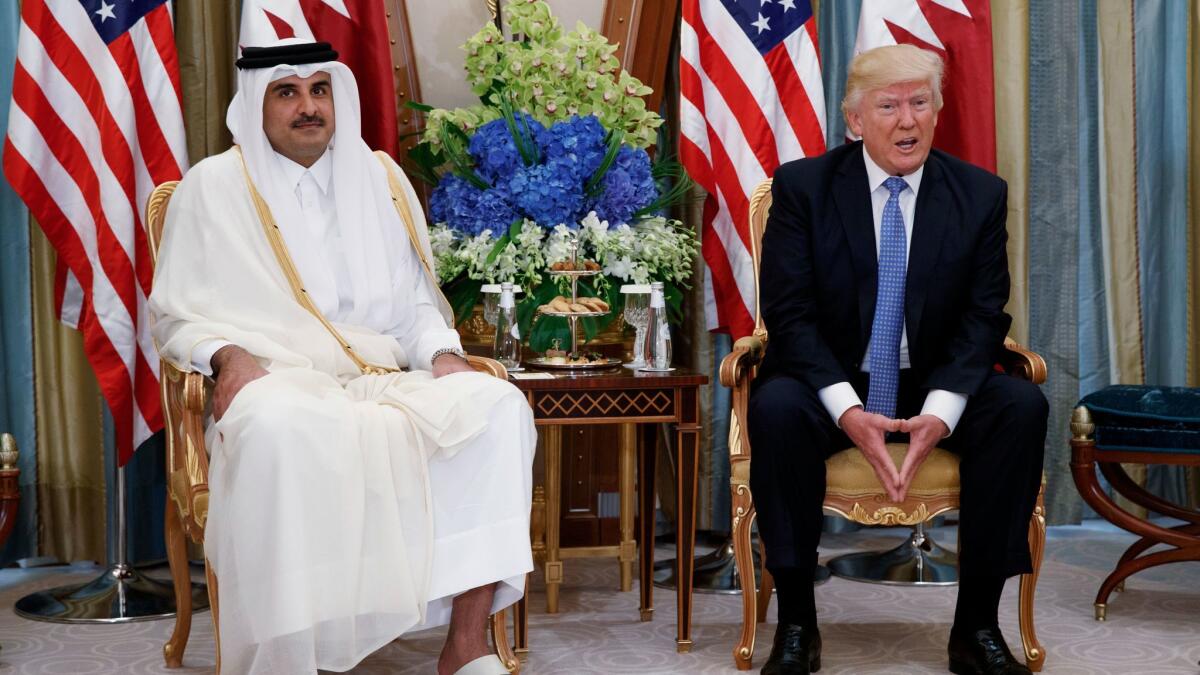Op-Ed: Qatar is a financier of terrorism. Why does the U.S. tolerate it?

Five Arab countries cut ties to Qatar on Monday, deepening a rift among Persian Gulf nations over that country’s support for radical Islamist groups. The United Arab Emirates, Egypt, Saudi Arabia, Bahrain and Yemen all announced they would withdraw their diplomatic staff from Qatar and cut air and sea traffic to the country.
As part of what former U.S. Secretary of State Condoleezza Rice termed the “New Middle East,” Qatar has emerged as one of the region’s most consequential players and one of the richest countries in the world. It has also positioned itself as one of the strongest supporters of the Arab Spring, preaching democracy abroad. But behind the polished façade of skyscrapers and luxury shopping malls lies a dark reality. Ruled by the Al-Thani clan, the onetime British protectorate has become a financier of terrorism.
One week after welcoming U.S. Defense Secretary Jim Mattis in April, Qatar hosted a conference by Hamas. The Al-Thani family is a major backer of the terrorist organization, pouring millions every year into the Gaza Strip to cement Hamas’ grip on power. Last year alone, Qatar transferred $31 million to Hamas, and the country is expected to pledge an additional $100 million to Gaza.
Western leaders have largely turned a blind eye to Qatar’s abysmal human rights record at home and malevolent behavior abroad.
Also on the list of Qatar’s beneficiaries is the radical Muslim Brotherhood, the parent organization of Hamas. The Qatari government has bankrolled the Muslim Brotherhood and affiliated groups with billions of dollars across the Middle East. Qatar was a key supporter of the Mohamed Morsi-led regime in Egypt, and members of the Egyptian Brotherhood have lived in Doha for decades. Brotherhood figures are frequently featured on the Qatari-owned Al Jazeera network, spreading their anti-Western world view to more than 60 million people.
Qatar has emerged as a key financier of the Syrian opposition, including Salafi jihadist groups as well as Sunni Islamist organizations. Diplomatic sources estimate that Qatar has invested at least $1 billion in anti-Bashar Assad forces, with people close to the Qatari government putting the number as high as $3 billion. Qatar has channeled weapons and money to Islamist rebels, notably to the notorious organization Ahrar al-Sham, which has known ties to Al Qaeda. Far from being a force of moderation, Ahrar al-Sham has fought alongside Jabhat al-Nusra, also known as Al Qaeda in Syria. Qatar’s ruling emir, Sheikh Tamim bin Hamad Al Thani, has been trying to get Jabhat al-Nusra off America’s terror list by championing a cosmetic separation between the group and the umbrella Al Qaeda branch. It now operates under the banner of Fateh al-Sham.
In a smart PR move, the government in Doha has financed Western research institutions and think thanks with hundreds of millions of dollars to push the myth of moderate Islamist groups in Syria. Qatar cites Ahrar al-Sham and Jabhat al-Nusra as examples, claiming that their sole purpose is to remove Assad. Too many Western leaders accept this rhetoric. One exception is Germany, which has gone so far as to implicate Qatar as a sponsor of Islamic State.
Qatar’s close cooperation with Iran puts the country at odds with Gulf powers that are firmly aligned against the theocratic regime in Tehran. “Iran represents a regional and Islamic power that cannot be ignored and it is unwise to face up against it,” Sheikh Tamim Bin Hamad Al Thani reportedly said at a military ceremony in May. “It is a big power in the stabilization of the region.” He also reportedly described Hamas and Hezbollah as a resistance movement, calling Hamas “the legitimate representative of the Palestinian people.” (The Qatari government later claimed that the Qatar News Agency’s website was hacked.)
Western leaders have largely turned a blind eye to Qatar’s abysmal human rights record at home and malevolent behavior abroad. This is partly due to the significance of the al-Udeid air base, from which nearly all coalition airstrikes against Islamic State are being conducted. But there may be more costs to our ongoing partnership with Qatar than benefits. Now that our allies are publicly breaking with the Gulf state, Washington should put pressure on the government in Doha to pick a side. Qatar has gotten away with its opportunistic, two-faced foreign policy for too long.
Joshua S. Block is president and CEO of the Israel Project.
Follow the Opinion section on Twitter @latimesopinion or Facebook
More to Read
A cure for the common opinion
Get thought-provoking perspectives with our weekly newsletter.
You may occasionally receive promotional content from the Los Angeles Times.






